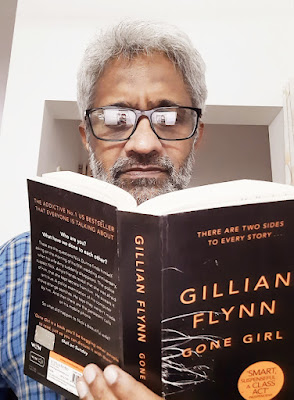Gone Girl
Book Review
Title: Gone Girl
Author: Gillian Flynn
Publisher: Weidenfeld &
Nicolson, London, 2012
Pages: 466
This is a masterpiece. It makes you laugh a lot,
especially in the early pages. Then it fills you with awe; awe at the
complexity of the two main characters: Nick Dunne and his wife Amy Elliott
Dunne. As you move to the final section, it terrifies you.
This novel is a thriller. Amy Elliott
Dunne has vanished. All evidence points to Nick Dunne as the murderer though Amy’s
body is not found. There is her diary and a lot more that put Nick in the dock.
The whole story is told by Nick and Amy in alternate chapters. And they are
amazing narrators. Both are writers, after all. Nick was a journalist writing
TV and movie reviews. Amy’s specialisation was making personality quizzes for
magazines. Both lost their jobs due to the Recession in 2009 and so they move
to Nick’s hometown of North Carthage, Missouri, where Nick opens a bar with his
sister Margo. He also finds a job as a teacher of journalism which gets him
entangled with a young and beautiful – and immature too – student, Andie.
Did Nick murder Amy in order to live
with Andie? Is Amy dead at all, in the first place? Both Nick and Amy are very
intriguing and complex characters. When we meet them in the initial pages of
the novel, they are two jobless grown-ups who spend weeks wandering around
their “Brooklyn brownstone in socks and pajamas, ignoring the future, strewing
unopened mail across tables and sofas, eating ice crem at ten a.m. and taking
thick afternoon naps.”
Soon we see their true colours in all
their possible shades. The plot becomes not just suspenseful but clever. Terribly
and terrifyingly clever. You begin to be amazed by the intellect of the
novelist. If I tell you more about that intellect, this review will be a
spoiler. I would like you to read the book and relish it. Relish its bizarre
humour, insights into human psychology, the intricacies of a criminal mind, and
the dreadful ironies of human life.
I quoted a few lines from this novel
in an earlier post
and Blogger flagged that post. I shall keep this review chaste if only to
follow “Blogger’s community guidelines.”

Have you seen the movie based on the book?
ReplyDeleteNo. I was told the movie leaves some horrifying images in memory.
Deletewould you read anther book by this same authors.
ReplyDeleteCoffee is on, and stay safe.
Not now anyway.
Delete